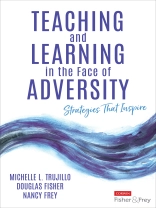‘You may encounter many defeats, but you must not be defeated. In fact, it may be necessary to encounter the defeats so you can know who you are, what you can rise from, how you can still come out of it.’ —Maya Angelou
Adversity is all around us. Although we can′t always avoid it, we can prepare ourselves and our students to respond in a healthy and hopeful way.
Teaching and Learning in the Face of Adversity is a practical and heartfelt book that empowers educators with applicable strategies to respond to challenges, inspire students, and foster a positive school environment. The authors share the critical skills that educators and students can cultivate to elevate the ability to respond to barriers, challenges, and setbacks, plus:
- Practical strategies, insights, and reflection prompts
- Menus of practices to promote student agency, belonging, relationships, and repair harm
- The voices of real teachers, students, and educational leaders
- The range of challenges that can arise in our work and effective ways to respond
Adversity may be ever-present, but with the resources in this book, we can empower ourselves, our colleagues, and our students to persevere in the face of it.
Tabela de Conteúdo
About the Authors
Introduction
Lesson One: Be Intentional
Lesson Two: Create Connections
Lesson Three: Seek to Understand
Lesson Four: Lead with Love?
Final Reflection
Appendix: Activities That Ignite Hope, Nourish Well-Being, and Engage Students
Sobre o autor
Nancy Frey is a Professor in Educational Leadership at San Diego State and a teacher leader at Health Sciences High and Middle College. She is a credentialed special educator, reading specialist, and administrator in California. She is a member of the International Literacy Association’s Literacy Research Panel. Her published titles include The Illustrated Guide to Visible Learning, Welcome to Teaching Multilingual Learners, Teaching Foundational Skills to Adolescent Readers, and RIGOR Unveiled: A Video-Enhanced Flipbook to Promote Teacher Expertise in Relationship Building, Instruction, Goals, Organization, and Relevance.












